江苏省常州市新北区实验中学2019-2020年牛津译林版八年级上Unit8 测试卷(无答案)
- 格式:doc
- 大小:104.00 KB
- 文档页数:7
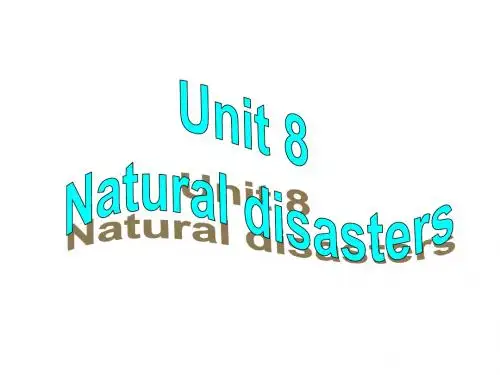

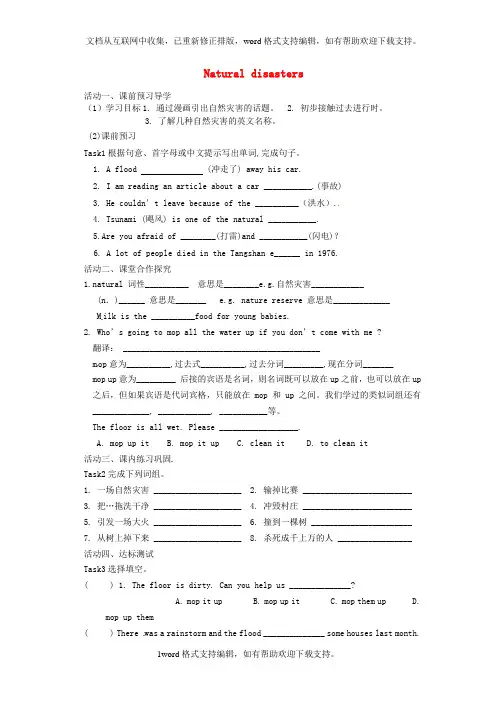
Natural disasters活动一、课前预习导学(1)学习目标1. 通过漫画引出自然灾害的话题。
2. 初步接触过去进行时。
3. 了解几种自然灾害的英文名称。
(2)课前预习Task1根据句意、首字母或中文提示写出单词,完成句子。
1. A flood (冲走了) away his car.2. I am reading an article about a car ___________.(事故)3. He could n’t leave because of the __________(洪水).4. Tsunami (飓风) is one of the natural ___________.5.Are you afraid of ________(打雷)and ___________(闪电)?6. A lot of people d ied in the Tangshan e______ in 1976.活动二、课堂合作探究1.natural 词性__________ 意思是________e.g.自然灾害____________(n.)______ 意思是_______ e.g. nature reserve 意思是_____________ M ilk is the __________food for young babies.2. Who’s going to mop all the water up if you don’t come with me ?翻译: _____________________________________________m op意为__________,过去式__________,过去分词_________,现在分词_______mop up意为_________ 后接的宾语是名词,则名词既可以放在up之前,也可以放在up 之后,但如果宾语是代词宾格,只能放在mop和up之间。

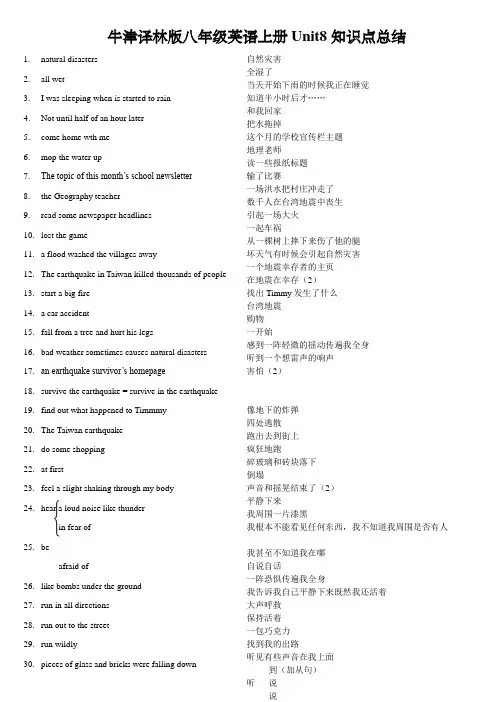
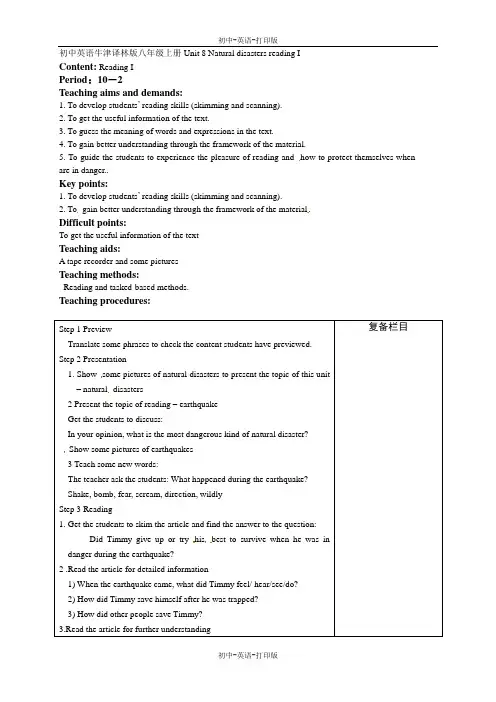
初中英语牛津译林版八年级上册Unit 8 Natural disasters reading IContent:Reading IPeriod:10-2Teaching aims and demands:1. To develop students’ reading skills (skimming and scanning).2. To get the useful information of the text.3. To guess the meaning of words and expressions in the text.4. To gain better understanding through the framework of the material.5. To guide the students to experience the pleasure of reading and how to protect themselves when are in danger..Key points:1. To develop students’ reading skills (skimming and scanning).2. To gain better understanding through the framework of the material.Difficult points:To get the useful information of the textTeaching aids:A tape recorder and some picturesTeaching methods:Reading and tasked-based methods.Teaching procedures:复备栏目Step 1 PreviewTranslate some phrases to check the content students have previewed.Step 2 Presentation1. Show some pictures of natural disasters to present the topic of this unit– natural disasters2 Present the topic of reading – earthquakeGet the students to discuss:In your opinion, what is the most dangerous kind of natural disaster?Show some pictures of earthquakes3 Teach some new words:The teacher ask the students: What happened during the earthquake?Shake, bomb, fear, scream, direction, wildlyStep 3 Reading1. Get the students to skim the article and find the answer to the question:Did Timmy give up or try his best to survive when he was indanger during the earthquake?2 .Read the article for detailed information1) When the earthquake came, what did Timmy feel/ hear/see/do?2) How did Timmy save himself after he was trapped?3) How did other people save Timmy?3.Read the article for further understanding1) Listen to the tape and finish Exercises C, textbook Page 972) Read with feelings and finish Exercises D, textbook Page 97Step 4 PracticePlay the tape for the students to listen and repeat. Then get the students to read the article loudly.Ask the stud ents to discuss : How to save yourselves when you are in danger?Step 5 HomeworkThink of ways of saving yourself during other natural disasters, write them down .Do the exercises in Part B, Page 96.Try to say something about the main idea of the article.教学反思:达标检测Unit 6 Reading I (40’)一、词组翻译(10’)1.在一个购物中心_____________________________2.恐惧地互相看着______________________________3.破碎玻璃片_________________________________4.一阵恐惧___________________________________5.吃一包巧克力_______________________________6.a sligh t shaking _______________________________7.run in all directing ____________________________8.clam down __________________________________9.shout for help ________________________________10. stay here for a long time _________________________二、根据中文完成句子(15’)1.他们告诉自己镇静下来。
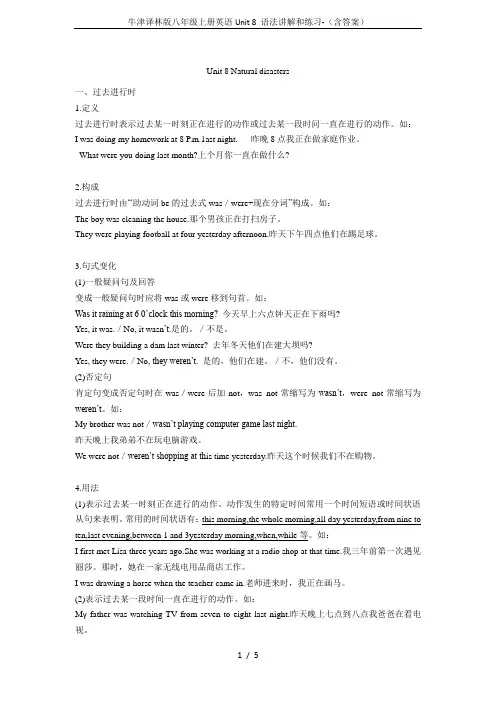
Unit 8 Natural disasters一、过去进行时1.定义过去进行时表示过去某一时刻正在进行的动作或过去某一段时问一直在进行的动作。
如:I was doing my homework at 8 P.m.1ast night. 昨晚8点我正在做家庭作业。
What were you doing last month?上个月你一直在做什么?2.构成过去进行时由‘‘助动词be的过去式was/were+现在分词”构成。
如:The boy was cleaning the house.那个男孩正在打扫房子。
They were playing football at four yesterday afternoon.昨天下午四点他们在踢足球。
3.句式变化(1)一般疑问句及回答变成一般疑问句时应将was或were移到句首。
如:Was it raining at 6 0’clock this morning? 今天早上六点钟天正在下雨吗?Yes, it was./No, it wasn’t.是的。
/不是。
Were they building a dam last winter? 去年冬天他们在建大坝吗?Yes, they were./No, they weren’t. 是的,他们在建。
/不,他们没有。
(2)否定句肯定句变成否定句时在was/were后加not,was not常缩写为wasn’t,were not常缩写为weren’t。
如:My brother was not/wasn’t playing computer game last night.昨天晚上我弟弟不在玩电脑游戏。
We were not/weren’t shopping at th is time yesterday.昨天这个时候我们不在购物。
4.用法(1)表示过去某一时刻正在进行的动作。
动作发生的特定时间常用一个时间短语或时间状语从句来表明。

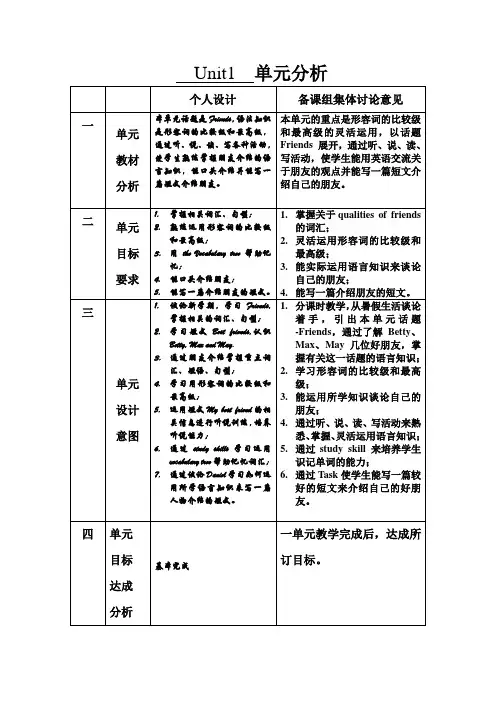
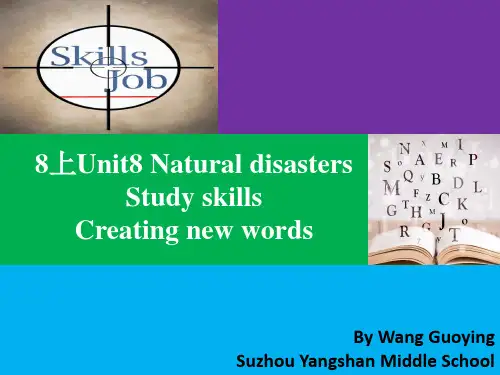
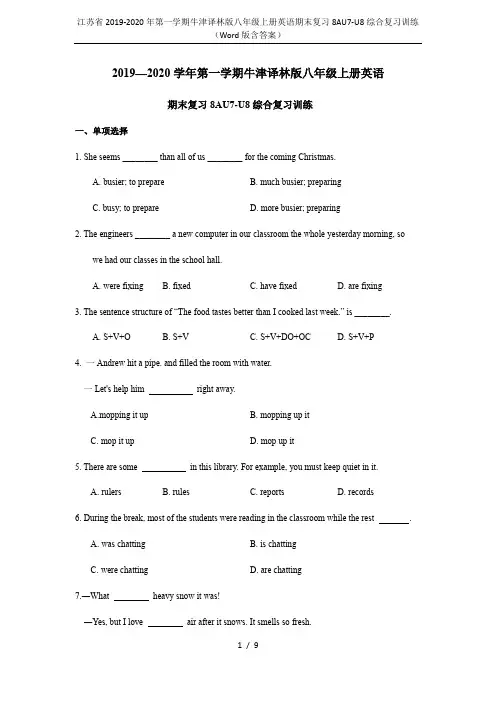
2019—2020学年第一学期牛津译林版八年级上册英语期末复习8AU7-U8综合复习训练一、单项选择1. She seems ________ than all of us ________ for the coming Christmas.A. busier; to prepareB. much busier; preparingC. busy; to prepareD. more busier; preparing2. The engineers ________ a new computer in our classroom the whole yesterday morning, sowe had our classes in the school hall.A. were fixingB. fixedC. have fixedD. are fixing3. The sentence structure of “The food tastes better than I cooked last week.” is ________.A. S+V+OB. S+VC. S+V+DO+OCD. S+V+P4. 一Andrew hit a pipe. and filled the room with water.一Let's help him right away.A.mopping it upB. mopping up itC. mop it upD. mop up it5. There are some in this library. For example, you must keep quiet in it.A. rulersB. rulesC. reportsD. records6. During the break, most of the students were reading in the classroom while the rest .A. was chattingB. is chattingC. were chattingD. are chatting7.―What heavy snow it was!―Yes, but I love air after it snows. It smells so fresh.A. the; aB. a; theC. the; theD. a; a8. Ice is not often seen here in winter as the temperature often stays zero.A. upB. downC. aboveD. below9.―How long may I the dictionary?―For 2 weeks.A. borrowB. lendC. keepD. buy10. Scared by the loud noise, the rabbits ran off _________all directions.A. onB. atC. inD. by11. — Simon, I called you at about 7:00 p.m. yesterday, but you didn’t answer it.— Sorry. I __________ with my cousin in the supermarket and it was really noisy.A. am shoppingB. was shoppingC. shoppedD. will shop12. — Mike, how about your trip to South Hill?— Not very good. Because our car __________ on the way.A. calmed downB. turned downC. broke downD. put down13. — _____ will the weather ______ tomorrow?— I hope it will be _______. There are many wet clothes at home.A. What; be like; sunnyB. What; be; cloudyC. How; be like; fineD. How; be; snowy14. Suddenly, Timmy felt a slight shake ______ his body.A. fromB. throughC. overD. across15. Boys and girls, follow the and do it carefully.A. discussionB. directionsC. applicationsD. instructions16. years go by, you will know how useful English is.A. AsB. WhenC. SinceD. While17. She may be slow, but ________ she is careful and doesn’t make stupid mistakes.A. at firstB. at lastC. at leastD. at most18.一Hiking and swimming are good ways to relax.一are OK, I think, but I like jogging best.A. BothB. NeitherC. AllD. None19. The earthquake_______ when I_______ some cleaning in the kitchen.A. starts; was doing B started; was doingC. was starting; was doingD. starts; were doing20. Would you like to sleep with the windows _______ or _______?A. open; closeB. opened; closedC. open; closedD. opening; closing21.-Not only I but also my classmates willing to take part in the activity.-But we only need one more person now. The rest to wait for another chance.A. are; haveB. am; hasC. are; hasD. am; have22.-What should I do when the earthquake happens, Dad?-First of all, it's important to and hide yourself in the corners of the room.A. calm downB. put downC. come downD. fall down23. —Listen! Someone is playing the piano.—Wow! beautiful music! I like it very much.A. HowB. How aC. WhatD. What a24.The water in the river ________ three feet because it kept raining heavily for two days.A. raisedB. roseC. grewD. added25. —Did you hear the shouts the little girl?—Yes. When I arrived there, I found her looking at a snake in fear.A. fromB. withC. atD. for26. I am very interested in this maths problem. Can you show me ?A. what to work it outB. what to work out itC. how to work it outD. how to work out it.27. --- Do you have any plans for this Sunday?--- I’m not sure. I ________ go to the countryside to see my grandmother.A. canB. mustC. mayD. need28. The policemen worked very hard to keep the international meeting ________.A. safeB. safelyC. safetyD. save29. The temperature will be _______ tomorrow. It will _______ to -5ºC.A. colder; fallB. less; fallC. higher; coverD. lower; drop30. Planting more trees _____ it _____ for people to protect more wildlife.A. make; possibleB. makes; possibleC. make; impossibleD. makes; impossible二、词汇运用A. 根据所给汉语提示写出单词的正确形式。
初中英语牛津译林版八年级上册Unit 8 Natural disasters reading IIContent: Reading IIPeriod:10-3Teaching aims and demands:1 .To revise what they learned about the earthquake and help the stud ents to understand the passage b etter .2 To read the passage again and help them to highlight the important language points and sentence patterns.3 To learn to write or read a passage following the sequence of how things happened4 To develop students’ ability to learn things by themselves. .5 To teach the students to learn to protect themselves when they are in dangerKey points:Highlight the important language points and sentence patternsDifficult points:How to highlight the important language points and sentence patternsTeaching aids:A tape recorderTeaching methods:PracticingTeaching procedures:Step 1 Revision复备栏目Ask and answer by using pictures1 What can you see in the picture ?2 What happened ?3 What happened to this building ?4 What kind of sound can you hear ?5 How do you know that there is going to be an earthquake ? How will youfeel at the very beginning ?6 If this building is shaking now , what will you do ? Will you be afraid /befrightened ? Are you going to scream ? Are you going to ru n/jump ?You should calm down and think what the best way to escape is , so thatyou can stay alive .7 Suppose you are in danger , that means there are lots of bricks around you ,you can’t move your body , you’re trapped . What are you going to do ?8 If you have a packet of chocolate , you’re hungry ,are you going to eat it ?Why or why not ?Step 2 preview exercises :Check t he students preparation for the lesson before class by doing someexercises.Step 3 ReadingGet the students to read the article and make lists of words andphrases used in the text that describe noise and movement/destruction ,fear and hopeSuch as : noise : big noise ,thunder , screamed , real noise , bombs ,shoutedmovement : slight shaking earth started to shake ,run wildly , pieces ofglass bricks fell down ,walls began to come down .fear : screamed frightened dark a moment of fearStep 4 ExplainingDeal with the problems the students may have.1 do some shopping such as : do some washing /cleaning /reading etc.2 feel a slight shaking 感到一阵轻微的震动。
牛津译林版-英语-八上-8单元Naturaldisastersintegratedskills初中英语牛津译林版八年级上册Unit 8 Natural disasters integrated skillsContent: In tegrat ed skillsPeriod:10-7Teaching aims and demands:1.To understand the process of producing an accident report form.2.To grasp the key expressions used in an emergency call and an accident report.3.To know more about what to do at the time of meeting an accident.Key points:1.The key expressions used in an emergency call.2.How to make you rself safe when there is an accident, a natural disaster or other dangerous things. Difficult points:1.The methods of keeping oneself safe from an accident or a disaster.2.Teaching methods: listening and task-based methodsTeaching aids:A tape recorde rTeaching methods:Listening and discussi onTeaching procedures:复备栏目Step 1 Revision1.Revise the past continuous tense with some exercises.2.Talk about different kinds of weather and disasters with some pictures. Getthe students to guess what bad weather or a disaster can c ause or start.Step 2 PresentationShow a picture of a snowy day and get the students to answer the questions.1.Is the world all white? (Teach the word ‘cover’ )2.How is the weather? ( Teach the word ‘condition’ )3.What may happen in this kind of days? ( T each the phrase and the word‘fall over,victim’ )4.What will you do if there is an accident? ( Teach ‘hotline, mobile phone,caller, serious’)Step 3 Listening and completing1.Get the students to listen to the tape carefully.2.Ask the students to complete part of the accident report form in Part A1 onPage 102.Step 4 Asking and answeringGet the students to listen to the tape again and answer the followingquestions:1.What was the date of the call/the time of the call/the time of arrival/theplace of the accident/the name of the caller?2.What were the weather conditions?3.How many victims?4.How are the victims now?5.What did the policemen do?Step 5 PracticeGet the students to complete the accident report form on Page 102.Step 6 Production(Pair work)1.Ask the students to read the information on Page 102. Then get them tomake up a dialogue between an interviewer and Mr. or Mrs. Su with thequestions like the following:What happened to you, Mr. Su?Were you alone in the car?Why didn’t you get out by yourself?Was anyone hurt?Did you call someone for help?Wh at do you think caused the accident?2.Act out the dialogues.Step 7 Practice(Completing)Get the students to complete the e-mail in Part A3 on Page 103 according tothe information on P age 102..Ask the students to read the e-mail on Page 103.Step 8 PracticeGet the students to discuss the ways of staying safe when there are someother disasters?Do some consolidation exercises.Homework:1.Make a report form when there are other accidents or disasters.2.Finish the rest exercises.3.Revise what you’ve learnt in this period.4.Get ready for the next period:Make up similar dialogues like the one on Page 103./When do we drop ourvoice when we speak?教学反思:达标检测Unit 6 Integrated skills (40’)一、用所给单词的适当形式填空:(16’)1. the policewomen (watch) the traffic or (have) a rest from seven to nine yesterday morning?2. Jim (draw) a picture in his room at 4 yesterday afternoon.3.---What you (do) during the Spring Festival?----I (visit) Thailand at that time.4. ---Why didn’t you go to the party last night?---I (wait) for an important call from Shanghai.5. What you (do) when I knocked at the door?6. While my mum (cook), my dad (read) newspapers.7. While/When the children (have) lessons, the earthquake (start).8. While Daniel (make) a snowball, he (fall) over.二、根据所给提示或单词,用其适当形式填空:(11’)1. All of us were excited about his (arrive).2. Ability is one of the (condition) of success(成功) in life.3. The teacher looked at the students (serious).4. Look, snow c everything. How beautiful!5.The fish smells t . Throw it away, please.6. The c of my health stops me from working.7. Don’t worry, madam. There’s nothing s .8. He called the 110 (热线) at 7:40 p.m. (use) his (手机).9. The building caught fire because lightning (hit) it.三、将下列短语译成英文:(10’)1.撞到一棵树上2.盖住所有的东西3.打电话人的姓名4.受害人的数量5.受害人的情况6.又冷又怕7.打110热线8.用手机9.坏天气可能很危险10.读报上有关汽车事故的文章四、将下列句子译成英语:(3’)1.在那次地震中,遇难者人数超过一万人。
2019—2020第一学期牛津译林版八年级上册英语8AU8完成句子专题整理训练1. 一阵大风从后面袭来,我几乎跌倒。
A strong wind ______________________________________________.2. 听了美妙的音乐后,我平静了下来。
I ____________________________________________ the beautiful music.3. 地震过后,灾区人民得到了来自四面八方的帮助。
After the earthquake, the victims _____________________________________.4. 他开会迟到了,因为他的汽车在路上抛锚了。
He was late for the meeting because his car __________________________________.5. 当你昨晚回家时,你妈妈正在做烙饼吗?___________________________________________ when you went back home yesterday?6. 我们都认为恶劣天气有时会引起自然灾害。
We all think that terrible weather ____________________________________________.7.他在除雪时差点摔了一跤。
He ______________________ while he ______________________ the snow.8. 当他被困在山里时,他用手机打电话求救。
He_______________________________when he__________________ in the mountain.9. 我们应该遵守什么规则来保护自己免受交通事故?What______________should we____________________________________________? 10. 砖头开始坠落,我的脑海掠过片刻恐惧。
8A Unit 8单元测试卷班级姓名___________一、听力部分(共20小题,每小题1分,共20分)听读空间U8单元检测二、单项选择题(本题共12小题, 每题1分,共12分)( ) 1. ______ a winter morning, my father fell ______ his bike _____ the ground.A. In; from; toB. At; down; toC. During; out; onD. On; off; onto( ) 2. If you _________, I will ___________ myself.A. don’t come; mop up itB. won’t come; mop up itC. don’t come; mop it upD. won’t come; mop it up( ) 3. ---__________ will the concert begin? ---________ seven o’clock.A How long; Not until B. How long; UntilC. How soon; Not untilD. How soon; Until( ) 4. I _______ in the kitchen yesterday evening when the telephone ______A. cooked; was ringingB. cooked; rangC. was cooking; rangD. was cooking; was ringing( ) 5. _________ you are so tired, you’d better have a good rest.A. SinceB. BeforeC. AfterD. So( ) 6. Jim _________ on the computer when his father returned home.A. worksB. workedC. was workingD. is working( ) 7 --- Do you know if Tom _________ fishing the afternoon?--- I’m not sure. But if he ________ go, I won’t go, either.A. goes, won’tB. goes, doesn’tC. will go, doesn’tD. will go, won’t( ) 8. When the bus stopped, some people ______the bus and some others ______A. got off; got on itB. got off; got it onC. got it off; got on itD. got it off; got it on( ) 9. He didn’t go climbing the hill ___________ the heavy rain.A. becauseB. because ofC. soD. 不填( ) 10. The rain was so _________ that the climbers had to walk __________A. heavy; slowB. heavily; slowlyC. heavy; slowlyD. heavily; slow( ) 11. They __________ in the snow when a boy ___________.A. played; was falling downB. were playing; fell overC. are playing; fall downD. played; was falling down( ) 12. A moment of __________ went through her mind and she couldn’t wait _________ others about the good news.A. fear; forB. fear; to tellC. joy; to tellD. happy; for telling三、完形填空(本题共12小题,每小题1分,共12分)阅读下面短文,掌握其大意,然后从所给的四个选项中,选出一个最佳答案。
Carson was having dinner with his mother and sisters one evening. Suddenly his younger sister asked, “ 1 does it look like that outside?” Everyone looked out of the window on the north side of the kitchen. They saw the sun in a blue sky. Then, they looked out of the window on the south side of the kitchen. They saw a dark sky 2 big,grey clouds. Next,they heard the tornado siren(龙卷风报警).That meant a tornado was coming. They all knew that during a tornado,the 3 place to be is underground. 4 , they had a basement (地下室).They all ran quickly into the basement. Suddenly, Carson remembered the pet cat, Pete. "Mum, we 5 Pete!” Carson yelled, “ I will go upstairsand find him!” But his mother said, “ 6 , Carson! It’s too dangerous. The tornado is coming, you ha ve to stay down here.” All at once they 7 the very loud noise of a very strong wind. It was 8 loud that although they were screaming, they could not even hear their own screams. Everyone was very scared.Just 9 seconds later,it was finished. The tornado went away and everyone was safe. Carson ran upstairs and found that the house was 10 damaged and Pete was gone. He began to cry and went outside. He saw that all the trees were knocked down 11 one. And at the top of the tree, there was Pete, looking at Carson and waiting for him to help him 12 .( ) 1. A. How B. What C. Why D. Where( ) 2. A. with B. have C. has D. having( ) 3. A. safe B. safely C. safest D. safety( ) 4. A. Lucky B. luck C. luckily D. Unluckily( ) 5. A. forgot B. left C. leave D. forget( ) 6. A. Sure B. All right C. Yes D. No( ) 7. A. heard about B. heard C. listened to D. listened( ) 8. A. very B. such C. too D. so( ) 9. A. a few of B. a little of C. a few D. a little( ) 10. A. bad B. badly C. worse D. worst( ) 11. A. except B. besides C. expect D. beside( ) 12. A. away B. off C. up D. down四、阅读理解。
从每题所给的四个选项中选出最佳答案。
(本题共15小题,每小题1分,共15分)AKim Bogue, a keeper in California, worked overtime to save money for a trip to Thailand to visit her family and friends. She saved over 900 dollars and was planning to buy a ticket but she lost her purse with all her money and credit cards.Kim looked through the garbage and all the buildings where she worked but came up empty-handed. She went home heartbroken. She believed that she had lost her money forever. While Kim was at home, sad and depressed, a homeless man was searching through the garbage looking for things to sell. As he was looking through a garbage bag, he found something wrapped in a plastic bag.The homeless man, who did not want to be identified, took the purse to Sherry Wesley, because Sherry Wesley knew him from her volunteer work at a homeless shelter. The homeless man came to Sherry Wesley with the wad of money and said, “This probably belongs to someone that you work with, can you find the owner?”Sherry Wesley works in one of the buildings that Kim cleans and she knew Kim had lost her purse.Kim was amazed when she heard the good news. “I couldn’t believe it when they called me,” she said.“He has a very big heart. If someone else had found the purse, the money would be gone. ”As a reward, Kim gave the man 100 dollars. The homeless man gave half of the money to Sherry Wesley and asked her to donate it to charity for him.( ) 1. Kim worked overtime to save money for her family and friends in Thailand.A. helpingB. visitingC. GivingD. saving( ) 2. While Kim was at home, sad and depressed, a homeless man found _________by accident.A. the garbage bagB. something to sellC. the purse Kim lostD. nothing important( )3. From paragraph 3, Sherry Wesley was a who worked at a homeless shelter.A. volunteer workerB. homeless manC. building cleanerD. blindness( )4. At the end of the story, the homeless man gave _____dollars to charity.A. 900B. 100C. 50D. 80( ) 5. The sentence in the last paragraph “He has a very big heart.” Means __________in Chinese.A. 他很贪心B.他有野心C. 他很高尚D. 他心胸宽广BT he word “day” has two meanings. When we talk about the number of days in a year, we are using “day” to mean 24 hours. But when we talk about day and night, we are using “day” to mean the time between sunrise and sunset. Since the earth looks like a ball, t he sun can shine on only half of it at a time. Always one half of the earth is having day and the other half night. A place is moved from day into night and from night into day over and over by the spinning(旋转)of the earth. At the equator(赤道)day and night are sometimes the same length(长度). They are each twelve hours long. The sun rises at 6 o’clock in the morning and sets at 6 o’clock in the evening. For six months the North Pole(北极)is tilted (倾斜)toward the sun. In those months the Northern Hemisphere(半球)gets more hours of sunlight than the Southern Hemisphere(半球). Days are longer than nights. South of the equator nights are longer than days. For the other six months the North Pole is tilted away from the sun. Then the Southern Hemisphere gets more sunlight. Days are longer than nights. North of the equator nights are longer than days. Winter is the season of long nights. Summer is the season of long days.( ) 6. When the Western Hemisphere is having day, the Eastern Hemisphere is having ________.A. both day and nighB. dayC. neither(既不)day nor nightD. night( ) 7. A place is moved from day into night and from night into day over and over by ________ of the earth.A. the pushingB. the pullingC. the spinningD. the passing ( ) 8. At the equator day is as long as night ________.A. sometimesB. neverC. usuallyD. always( ) 9. When the North Pole is tilted toward the sun, the Northern Hemisphere gets ________ sunlight.A. lessB. moreC. allD. no( ) 10. When it is winter in China, ________.A. the USA is tilted toward the sunB. the South Pole is tilted away from the sunC. the North Pole is tilted toward the sunD. the North Pole is tilted away from the sunCWe use the Internet for many things: business, shopping, writing letters, talking to people, finding information and so on. In recent years, a new kind of English has grown on the Internet. There's no real word for it yet, so we'll call it e-talk.People don't like typing too much. To save time, they turn phrases into a few letters (called acronyms). Acronyms are often used in chat rooms(聊天室). Some of them are: BTW (by the way) BRB (be right back)LOL (laughing out loud) IMO (in my opinion)People also use many abbreviations. They are shortened forms of words. Some common abbreviations are:info (information) puter (computer)pic (picture) sec (second)We usually don't see people when we communicate(交流)on the Net, so people have new ways to show feelings. Most people use their keyboards to draw "feelings", such as::-) (happy) ;-) (joking) :-( (sad) :-O (surprised)These days, many forums (论坛) have picture feelings. For example:(happy) (sad) (angry) (cool) There are even whole new words, like "newbies"(someone who is new on a chat board or forum). When you write something bad about someone else, it's called "flaming" the person.It takes time for people to get used to(适应) e-talk. Also, different groups on the Net have their own special ways of communicating. Newbies sometimes have to ask other people what they mean. As the Internet grows, e-talk will continue to grow and change. ( ) 11. Why do people type acronyms?A. To show their feelings.B. To make jokes.C. Because people can type them quickly.D. In this way newbies won't understand them.( ) 12. What does, BTW, my puter is not working well. :-( mean?A. The person is happy about getting a new computer.B. The person has to go away from their computer.C. The person is angry at somebody.D. The person is sad that his computer is having problems.( )13. If someone is angry, what may he type?A. B. C. LOL D. BRB.( ) 14 E-talk will probably____________.A. keep changingB. stay the sameC. be used by people on the telephoneD. be easy for newbies to understand ( ) 15. The best title for this passage is________.A. E-talkB. Picture FeelingsC. How to Use AbbreviationsD. The Changing Internet五、任务型阅读。